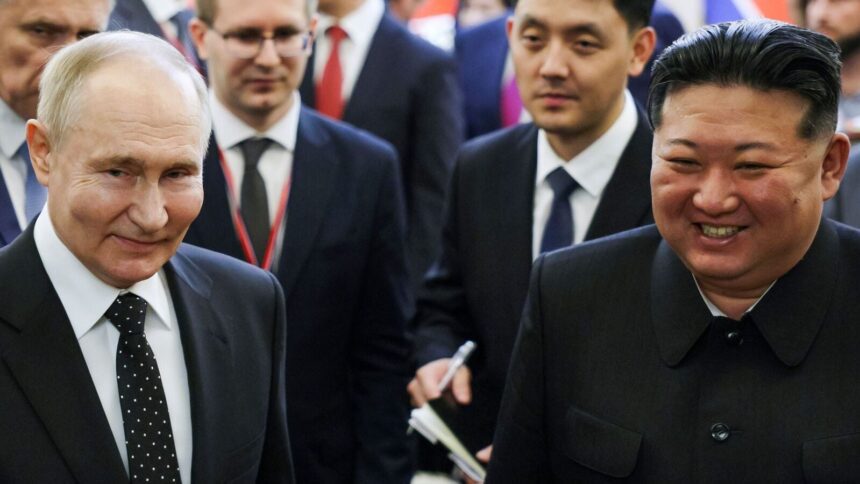Television viewers in North Korea were treated to a special program just after the New Year. The state-controlled broadcaster presented “72 Hours,” a new film that recounts the initial days of the Korean War, portraying it as a conflict instigated by the malicious South. (In reality, the first strike was launched by North Korea’s founding leader, Kim Il Sung.) A prominent theme of the film is the significance of maintaining close relations with Moscow. Among its viewers is the Russian ambassador stationed in Pyongyang, the capital of North Korea.
Currently, Russia and North Korea are collaboratively scripting a new chapter in their military history. North Korea has reportedly sent approximately 12,000 troops to support Vladimir Putin’s operations in Ukraine. These soldiers are believed to belong to North Korea’s elite forces, specifically the “Storm Corps,” which may trace its origins to a notorious attempt to assassinate South Korea’s president in 1968. North Korean personnel began arriving at the Ukrainian front in early November and have recently engaged in increasingly intense combat in Russia’s Kursk region, an area dominated by Ukrainian forces last year.
The proposal to deploy troops for Russian assistance reportedly came from North Korea itself. This deployment poses significant risks for Kim Jong Un, the leader of the country. The combat has been harsh, and North Korean soldiers seem ill-equipped for modern drone warfare and the expansive, open terrain of Kursk—so different from their mountainous homeland. On January 11, Volodymyr Zelensky, the president of Ukraine, mentioned that two North Korean soldiers had been taken prisoner by Ukrainian forces. South Korean intelligence sources estimate that around 300 North Korean troops have been killed and an additional 2,700 have sustained injuries. According to Kim Yung-ho, South Korea’s minister of unification, such casualties could potentially impact North Korean society as well.
What is in it for Mr. Kim? Likely, he is receiving continued assistance that has already been exchanged for North Korean ammunition—resources such as fuel, food, and other supplies that enable North Korea to endure Western sanctions. Since North Korea began supporting Russia’s military endeavors in mid-2023, satellite imagery has indicated “unprecedented levels of traffic” in customs areas between the two nations, according to Victor Cha from the Centre for Strategic and International Studies, an American think tank. South Korean intelligence estimates the North Korean regime may gain as much as $2,000 per month for each soldier deployed.
North Korea is also aiming for advanced military technologies. Alongside designs for intercontinental ballistic missiles and re-entry vehicles, there is interest in submarine and satellite technology. Such assistance can be elusive to detect. “It’s a blueprint in a suitcase; we might not necessarily observe it,” remarks Bruce Klingner of the Heritage Foundation, another American think tank.
Western governments assess that Russia has become increasingly willing to share technical expertise that it once classified as sensitive. During a recent visit to South Korea, U.S. Secretary of State Antony Blinken indicated that the United States believes Russia plans to provide advanced space and satellite technology to North Korea in exchange for military support.
However, the exchange encompasses more than just tangible resources or weapon designs. A “softer technology transfer” is also taking place, states Peter Ward from the Sejong Institute, a South Korean think tank. North Korea is observing the performance of its ammunition and missiles in actual combat scenarios and against Western air-defense systems. Troops are gaining rare experiences at the frontlines and can learn from Russia’s contemporary warfare tactics. Nevertheless, the most prominent lesson seems to focus on the pivotal role of drones and electronic warfare in current battlefields. In November, Mr. Kim visited a North Korean production facility to oversee drone demonstrations and mandated large-scale manufacture of suicide drones.
There are boundaries to the knowledge that can be acquired. Russia may be more interested in utilizing North Korean troops as expendable resources rather than involving them in complex operations. Many of these soldiers might not return home, warns Jenny Town of the Stimson Centre, a Washington think tank. Those who survive could gain insights that their government would prefer to keep hidden. Controlling the flow of information among front-line soldiers is challenging. Troops may also witness the comparative wealth of both Russia and Ukraine versus their own country. “They will come back with invaluable experience, but potentially also perilous ideas,” states Andrei Lankov of Kookmin University in Seoul.
Mr. Kim has evidently concluded that the potential benefits surpass the associated risks. The ultimate goal could be to establish a long-term strategic alliance that endures beyond the conflict in Ukraine. Sending soldiers to sacrifice for Mr. Putin’s agendas is one way to demonstrate commitment. As Ms. Town articulates, “There’s a blood debt now.”
The Economist Newspaper Limited. All rights reserved. From The Economist, published under licence. The original content can be found on www.economist.com










